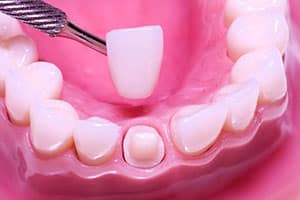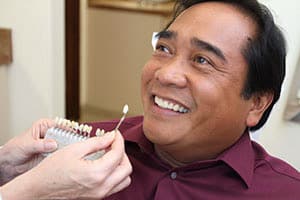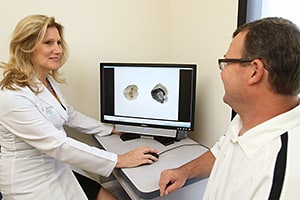Porcelain Crowns in Santa Clara

Crowns that are durable and look natural
Crowns recreate the form and function of a damaged tooth by capping the entire external portion of the tooth down to the gum level. They are frequently used when teeth have cavities that are too large for fillings.
In addition, crowns may be used for cosmetic purposes. Broken or chipped teeth can be capped for a more attractive appearance.
High-quality materials
Dr. Jayne uses superior materials such as Emax and zirconia to ensure that your crown will be resilient and durable. Porcelain also reflects light in the same manner as tooth enamel, providing a very natural look.

Natural-looking, durable porcelain crowns are used to repair teeth that have been damaged due to decay or trauma.
For back molars that handle heavy chewing, Dr. Jayne may suggest a crown that is made of porcelain fused to metal or a gold crown containing high noble metal. Noble metals interact well with human tissue, and hold up to corrosion and oxidation better than other metals. Dr. Jayne prefers to use materials that are made in the United States.
Experienced crown design and placement
Dr. Jayne has a great deal of experience placing crowns, and knows how to keep a patient comfortable throughout the entire procedure. She thoroughly numbs gums before gently injecting anesthetic. She also applies a mixture of cocoa butter and vitamin E to your lips, offers headphones with soothing music, and asks if you need to take a break.
Dr. Jayne has been practicing cosmetic dentistry for decades, and uses her knowledge of aesthetics to choose the perfect color, shape and shade of crown for your tooth. She works closely with a highly skilled lab to fabricate your crown. Her knowledge of restorative techniques combined with thorough diagnostic work gives you a crown that is fully functional and beautiful.

Dr. Jayne uses her eye for detail to choose the best shade and shape for your new crown.
When crowns are used
Crowns are typically used to:
- Repair cracked, damaged or broken teeth
- Cap a tooth that has extensive tooth decay
- Protect a tooth that has undergone root canal therapy
- Replace large metal fillings that have weakened the tooth structure
- Cover teeth that are permanently stained or discolored
- Level out and improve bite problems
- Fill minor spaces between teeth
- Provide a permanent replacement for missing teeth
- Cover crooked or unshapely teeth

Dr. Jayne explains the differences between types of crowns.
To make an appointment, call 408-243-5107 or click here to request an appointment online.








